By the CNN Wire Staff
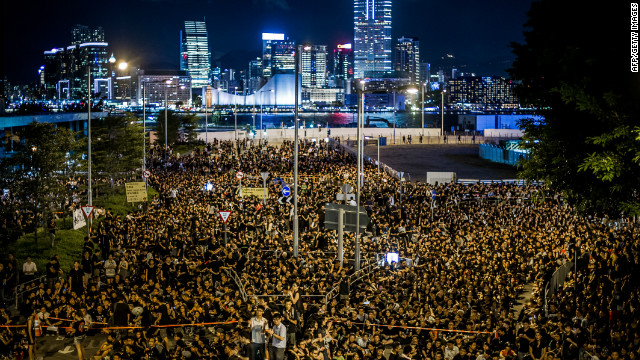 C.Y. Leung, the city's chief executive, said Saturday individual schools would have the option to adopt the controversial curriculum called "Moral and National Education." "We're giving the authority to the schools," he said.
C.Y. Leung, the city's chief executive, said Saturday individual schools would have the option to adopt the controversial curriculum called "Moral and National Education." "We're giving the authority to the schools," he said. A student addresses a crowd in front of government headquarters in Hong Kong on Friday, September 7 during a protest against plans to introduce Chinese patriotism classes.
Students shout slogans in front of the Central Government Offices in Hong Kong on September 3, 2012.
China subject prompts HK protests
Hong Kong (CNN) -- The Hong Kong government has scrapped plans to introduce a mandatory Chinese civic education subject critics had slammed as pro-mainland propaganda.
The decision came on the eve of local elections and after a series of protests including a 10-day hunger strike on the steps of the government headquarters.
C.Y. Leung, the city's chief executive, announced Saturday that individual schools would have the option to adopt the controversial curriculum called "Moral and National Education."
"We're giving the authority to the schools," he said. "This is very much in line with our school-based education policy."
New curriculum angers Hong Kong students
A coalition of concern group had protested against the subject which they said amounted to "brainwashing" impressionable young minds with pro-mainland Chinese propaganda.
China's critics cry 'brainwashing'
Hong Kong has a large degree of autonomy from the Beijing government as part of the agreement made with Britain after the 1997 transfer of power.
The course material had been outlined in a government booklet called "The China Model," which was distributed to schools in July.
China's ruling party is "progressive, selfless and united," the booklet said. It criticized multi-party systems as bringing disaster to countries such as the United States.
The booklet also makes no mention of major events that many view as integral to China's history, such as the 1989 Tiananmen Square massacre.
Anger over the government's initial plans to give schools a three-year deadline to introduce the subject prompted a number of major protests. The most recent was on Saturday when 100,000 protesters took to the streets, according to organizers' figures quoted by the South China Morning Post.
The SCMP reported that Leung denied the government back-down was timed to influence results of Sunday's Legislative Council election.
"If it hadn't been for the decision of the last administration, national education would not have been on the agenda of this government," Leung said, according to the SCMP.
"I would rather concentrate on housing, poverty and other livelihood issues. I've held numerous talks with the chief secretary on major policymaking, [and] none of our conversations ever touched on national education," he added.
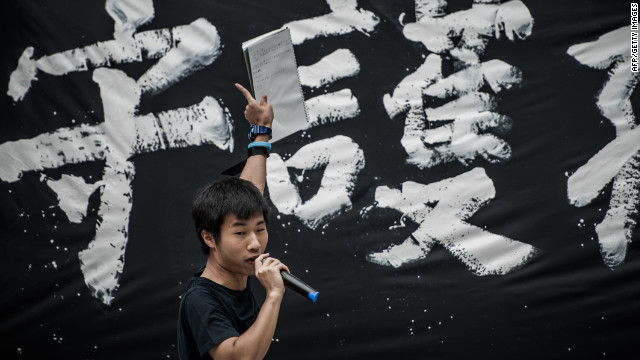 A student addresses a crowd in front of government headquarters in Hong Kong on Friday, September 7 during a protest against plans to introduce Chinese patriotism classes.
A student addresses a crowd in front of government headquarters in Hong Kong on Friday, September 7 during a protest against plans to introduce Chinese patriotism classes. 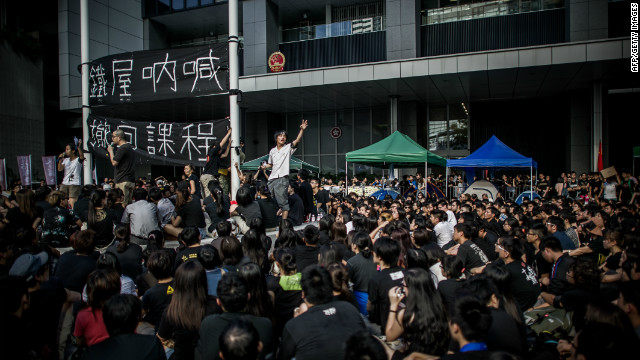 Students shout slogans in front of the Central Government Offices in Hong Kong on September 3, 2012.
Students shout slogans in front of the Central Government Offices in Hong Kong on September 3, 2012. 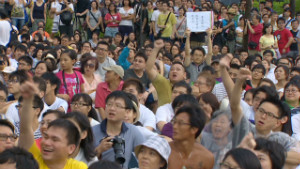
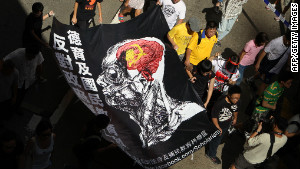














0 comments